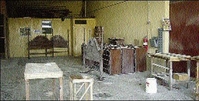Economic crisis hits furniture industry
Published: Sunday | February 22, 2009

With very few orders, there is little to make and sell at Leodor. - photo by Gareth Manning
LUMBER IDLY packed in corners of its factory is indicative of the reality many small companies, like Leodor Steel and Wood Company, have been facing since last September, when the worldwide economic downturn commenced.
There are currently no orders for furniture, and without orders, there is little work for employees.
Leodor, a company which, up to early last year, had a staff complement of 30, now has only four.
Three years ago, its factory was burnt to the ground, but its principal, Doris Pitt, managed to put the company back on its feet last year.
This time, however, Pitt is not sure how it will weather this storm.
With no orders for furniture from its main clients, furniture retailers Singer and Courts, there is hardly anything to call revenue and the company is barely surviving.
"Business has dramatically slowed down. It is like literally dead," Pitt says.
"Since November into the Christmas, the sales went right down and up to this point, we have no orders," she adds.
Apart from low demand, the sliding Jamaican dollar has been the biggest blow to the company. The local currency has devalued by some nine per cent against its United States (US) counterpart since January. Since September, the local currency has devalued by about 22 per cent.
devaluing currency
Leodor's core business at the moment is only wooden furniture manufacturing and it buys most of its lumber from the United States. It takes most of the lumber on credit from its supplier, which is a major part of the problem. The company ends up paying more for lumber, which it takes on credit as often, the original price at which the lumber would have been bought appreciates, as the US dollar gains strength against the Jamaican.
"You would have bought the lumber, say at the time the US dollar was valued at J$68, and by the time you are paying, you are paying at nearly J$90 for US$1. Although you got the credit, it is totally eroded by the exchange rate," says Leodor's general manager, Hubert Cummings.
The situation has not yet affected the relationship with their suppliers, but there is some fear that it will.
"It can't continue like that. When we need supplies, we might not get it as readily, because we are not able to pay as readily," Cummings lamented.
The devaluing dollar also poses another challenge to businesses, as often, prior to importing raw materials, the company would have already negotiated a fixed price with its clients for the product.
"When we get an order, for instance from Courts, say they pay us $1 and if it costs us more we cannot go back to them for any additional (money), because we are locked into a price already."
At home, Leodor has another matter on its hands as the price of finishing materials has been rising rapidly.
"We have had three price increases in a matter of four months," Cummings says.
Raising the prices of their goods has not necessarily been an option for the company due to the open and competitive market in which it operates. Hence, Leodor is often forced to absorb the loss.
survival
The outlook is bleak for the company. Leodor's priority now is not to make a profit, but to survive.
"I hate to say it and I don't want to say it, but the reality is if business doesn't change, I'll have to close," Pitt says. "We are just hoping and praying that business will pick up."
They don't have many suggestions as to how to stem the slide of the dollar, but Cummings suggests it might be useful for Government to now look at fixing the exchange rate.
"I'm not an economist, but if at the time when we had said fix the dollar, had we fixed it, then we certainly would not be looking at J$90:US$1," he says.

















